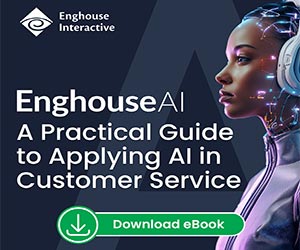In 2022, the global AI market reached $136.55 billion. With such a rapid expansion of AI across virtually every industry, it’s no surprise that artificial intelligence has reached the call centre. Using AI, you can increase operational efficiency, enhance compliance, boost retention, and more.
One of the most significant benefits of AI implementation is better agent training, and given the importance of agent performance to the overall success of a call centre, any improvements in this area are invaluable.
With ProcedureFlow reporting that less than 10 percent of contact centres have agents reaching proficiency in under two months and that over a third take five to seven months, it’s clear that the coaching process needs refinement.
Training is the foundation of CX, and AI-powered tools can enhance the learning experience for both agents and managers.
What Is Call Centre Agent Training?
Agents are at the heart of a successful call centre. To get them to perform to the best of their ability, you need to deliver regular, targeted training.
In a contact centre, training is a broad term, covering everything from compliance to soft skills. The most important thing is that your training programs are data-driven, based on clearly identified knowledge gaps, and delivered in an engaging, measurable manner.
Both agents and supervisors need to be able to track the success of the training to ensure its effectiveness. The right training strategies can also boost morale and improve retention—keeping agents on board by helping with their career development and personal growth.
Why Is Effective Agent Training Essential to Your Call Centre’s Success?
Without agents, a call centre cannot function. Without well-trained agents, it cannot thrive. To facilitate growth and increase revenue, you need to coach your agents not only to meet growing customer expectations but to exceed them.
Everything from customer experience and employee turnover to productivity and profit depends on your ability to get agents performing at their best.
Better CX
88 percent of consumers view customer experience as equally important to the product or service. Agents are the driving force behind CX, so you need to equip them with the tools to deliver.
This could mean technical know-how, product knowledge, or soft skills like empathy and emotional intelligence. Exceptional CX requires a range of skills, so it’s important that you provide agents with diverse training that targets their individual strengths and weaknesses.
Improved Customer Retention
According to a 2022 TechSee survey, 80 percent of customer churn is a result of poor service. If your service isn’t up to scratch, customers won’t stick around. And if they don’t stick around, they’re not going to make any more purchases.
Given that it’s easier to sell to an existing customer than it is to a new prospect, retention also impacts the bottom line. Coach your agents to consistently delight customers, and they’ll keep coming back for more and driving revenue.
Word of Mouth and New Customers
Training isn’t only beneficial for retaining existing customers; it can generate positive word of mouth and attract new customers too.
High-performing agents deliver great experiences, and word travels fast, with customers telling an average of nine people about a positive experience. In contrast, they will tell 16 people about a negative experience.
It’s clear that word of mouth is a valuable currency, so training agents to deliver great experiences doesn’t only serve existing customers—it influences future prospects too.
Improved Agent Satisfaction and Reduced Stress
Keeping agents engaged in their work and invested in their development is challenging. While new employees are typically excited to start a job, the enthusiasm may wane as time goes on, so it’s important to encourage agent engagement however you can.
Learning opportunities can show agents that you are invested in their growth, both inside and outside the workplace. You should offer them the chance to address skill gaps with tailored training, collaboratively or through self-directed learning, to cultivate employee happiness.
A LinkedIn report found that 49 percent of learners felt they didn’t have enough time for learning at work—yet 94 percent saw the career benefits of finding time to learn. If you can lower that first figure, you’ll have happier agents and, as a result, better CX.
Increased Productivity
Improving productivity is a persistent challenge for call centres. It’s also a pressing one, as productivity directly influences revenue. If the tickets are piling up and customers are spending too long waiting to connect with an agent, they’re likely to grow frustrated and take their business elsewhere.
A big cause of customer backlog is inefficient agents, whether that’s down to call quality or product knowledge, and the best way to improve agent efficiency is to provide training opportunities.
By digging into the causes of inefficiency, you can identify areas where agents lack the necessary skills or knowledge and target them in your coaching. This will allow you to pinpoint key call centre metrics like customer wait times or average handle time and take steps to improve them.
Reduced Agent Turnover and Increased Confidence
The average contact centre attrition rate is 42 percent. To mitigate this, contact centres need to find a way to reduce agent turnover and keep employees happy and engaged in their work.
It’s human nature that an agent will be more likely to stay in the job if they feel valued, so providing support right from the outset will go a long way to improving agent retention.
By offering opportunities for learning, you can show your employees that you care for their personal growth and career development—and who would want to leave a company that displays commitment to them?
Furthermore, the increased confidence brought about by this training will boost CX, as confident agents are more capable of handling complex customer issues efficiently.
Improved KPIs
Key performance indicators are, as the name suggests, the key to a successful call centre. Using a QA platform with built-in scorecards and reporting tools, you can identify the metrics that are most important to your organization and design your training programs accordingly.
This is applicable to the most common call centre metrics, such as CSAT, NPS, average resolution time, first contact resolution, and more.
Highly-skilled agents are better equipped to find solutions quickly and deliver them in a satisfying manner, boosting KPIs and proving the value of a data-driven approach to call centre agent training.
Bigger Profits
As noted previously, productivity influences profit, and training influences productivity. The right approach to contact centre learning can significantly influence the bottom line by enhancing agent efficiency.
The more efficient your agents are, the lower your costs, and of course, the lower your costs, the higher your profits.
Well-trained agents have the tools to handle queries quickly, freeing up time to handle other tasks and deal with further customer problems. It’s not just about efficiency either. Deloitte finds that customer spending may increase by up to 140 percent following a positive interaction.
Key Focus Areas for Call Centre Training
The agent’s role is growing more complex and demanding, and you must continually refine your training strategy to keep up.
Today, 84 percent of agents say that their companies view them as brand ambassadors. It’s no longer just about serving customers; it’s about finding extra opportunities in every interaction, whether that’s upselling or cementing loyalty.
With rising expectations from leadership and customers alike, agents need the right tools to face them. This is where training comes in. By focusing on the appropriate areas, you will put your agents in a position to thrive.
Call Quality
If you want your contact centre to fire on all cylinders, you have to get the basics right. This means keeping call standards high by consistently putting agents in a position where they can meet customer needs.
Every call impacts the overall opinion of your organization, influencing customer retention and loyalty, so it’s crucial that customers receive the solutions they’re looking for and leave the call satisfied with their experience.
The efficiency and quality of calls also greatly impact key metrics like first contact resolution and average handling time. Agents trained to handle a variety of common complaints will be able to deliver quick, satisfactory resolutions and keep your call centre running smoothly.
Product Knowledge
To deliver effective solutions, agents need an in-depth understanding of the product or service your organization offers. Otherwise, an agent may fall short of customer expectations, leaving the customer unsatisfied and missing the opportunity for further selling.
contact centre leaders can use quality monitoring tools like scorecards to identify knowledge gaps and design tailored training programs to ensure agents are educated on the product or service.
Cross-Selling/Upselling
The agent’s role is more diverse than ever before, with many call centres factoring a sales element into the job on top of existing customer service duties.
As the frontline of the organization, agents have a lot of one-on-one time with customers, putting them in a unique position to develop relationships and identify opportunities for cross-selling and upselling.
If a customer calls for assistance with one product, an agent can point them in the direction of another product which may be beneficial.
With this approach, you can embrace the full potential of each interaction, opening up the possibility of better conversion rates and a bigger average order size alongside a stronger overall customer experience.
94 percent of customers say that good service makes them more likely to make another purchase, so why not link service and sales to generate extra revenue?
Soft Skills
Empathy, emotional intelligence, and initiative are all signs of a great agent and, while seeking these traits in the hiring process can set you on the right track, you will need to continuously hone these soft skills in new and existing employees.
Patience, positivity, and adaptability are often regarded as intrinsic traits, but they can be cultivated with proper training. By incorporating soft skills in your scorecards, you can highlight the importance of these traits to both supervisors and agents, emphasizing the need for a human touch in every interaction.
Compliance
Regulatory adherence is more vital than ever for call centres, with NICE finding that 61 percent of companies are allocating more money to their compliance budgets than in previous years.
In order to guarantee compliance within your organization, you need to make sure that agents understand all applicable regulations and the potential consequences of a breach. To do this, you can design new scorecards to measure compliance or add sections to existing scorecards.
This will keep adherence in your agents’ thoughts and also allow you to identify areas where improvement is required so that you can focus your training on them. You can even identify high-performing agents in terms of compliance and use their interactions as examples for coaching sessions.
How Can AI Power Up Your Call Centre Agent Training?
Artificial intelligence is becoming a feature of many call centre operations, including training and coaching. Using AI solutions, leaders can improve performance, engage agents, and boost KPIs.
In the past, call centre technology was used for things like simple call routing. Now it is capable of monitoring calls and delivering feedback in real time. Call centre leaders can leverage such technological advancement to enhance their training programs and enable agents to do their best work.
Opportunity to Spot Trends Rather Than Highlight Isolated Cases
Artificial intelligence allows you to analyze 100 percent of agent–customer interactions, so you can easily identify knowledge and skill gaps and improve your data quality.
Before AI, coaching relied on a limited number of examples. With technology, you can be sure that you are basing your approach on clear trends rather than isolated incidents. This helps build agent trust in the process, as they can be sure that you are taking their entire performance into account instead of picking a small number of potentially flawed examples.
For instance, if you spot a consistent pattern where an agent fails to display empathy, you can build your next coaching session around this vital soft skill.
Track KPIs More Effectively and Accurately
With 100 percent interaction coverage, AI can help you track KPIs more accurately. However, where it really shines is in its ability to link these KPIs to agent performance.
Using scorecards alongside artificial intelligence, you can pinpoint issues that contribute to poor performance for key metrics like CSAT, NPS, and AHT. Then, having identified these contributing factors, you can determine where agents are falling behind and take steps to resolve these issues via training.
Take first contact resolution, for example. If an agent consistently falls short of their targets for this metric, you can use AI-assisted scorecards to find out why.
Perhaps they lack sufficient product knowledge, limiting their ability to deliver efficient solutions. If this is the case, you could design a training program based around bettering their product knowledge.
Detect and Address Compliance Issues
As noted, compliance is a growing concern for organizations worldwide, particularly contact centres that deal with a lot of personal information.
With effective training, you can not only stress the importance of regulatory adherence but also limit the possibility of a breach. Regular training sessions to keep agents up to date on the latest developments and guidelines are important, as are reminders of the potential consequences of a breach.
Using AI and scorecards in tandem, you can quickly and easily identify instances where agents fail to meet compliance standards and take action to prevent a recurrence for both the agent in question and the wider team.
This could be in the form of a one-on-one coaching session, updated training programs, or a company-wide outreach explaining the latest regulatory requirements.
Ongoing training in this area also forms part of your compliance audit trail, demonstrating a commitment to regulatory adherence. With AI providing 100 percent visibility into your interactions, you can detect breaches and set up automatic alerts.
Use Sentiment Analysis to Highlight Soft Skills Issues
AI software can analyze every single interaction that takes place in your call centre and extract insights around customer sentiment. Using the acquired data, you can identify broader trends or home in on individual interactions to see where agents are lacking soft skills like empathy and emotional intelligence.
One of the greatest strengths of AI is its ability to point out instances where these traits are absent. Using technology, you can see what works for customers and what doesn’t and build your soft skills training programs around this information, leading to improved service and overall CX.
Detect and Address Missed Upselling Opportunities
As we’ve seen from the research, the role of the agent is expanding. Agents are now salespeople and brand ambassadors, as well as customer service representatives. Given this development, it’s necessary for call centre leaders to incorporate sales techniques as part of their agent training.
Using artificial intelligence, you can identify situations where agents missed the opportunity to cross-sell or upsell and use these incidents as learning tools moving forward.
When an agent has a real-life example of where they could have done better, they are more likely to remember that incident and make better use of their sales skills next time.
Build Agent Trust
The right training approach will serve to build an agent’s trust in their supervisors and managers. The use of AI helps contact centre leaders develop transparent training programs based on all available data rather than isolated incidents, eliminating bias from coaching sessions and assuring the agent that they are being evaluated on their entire performance, not just a few handpicked examples.
You can also implement self-scoring to show agents that you trust their judgment and value their insights into their performance.
You can then use the data from the self-scoring process to direct training, even allowing agents to help you develop these sessions and set their own goals. This will further establish strong relationships in the call centre, boosting agent performance and retention.
Final Thoughts
The importance of call centre training is evident and so too is the value of implementing artificial intelligence as a training tool.
AI provides further opportunities to improve customer experience, address compliance issues, and boost key metrics while giving you a more detailed overview of operations throughout the entire organization.
However, despite all these advantages, you must remember that the technology is there to enhance your existing quality assurance and training processes, not to replace them entirely.
You still need competent managers, supervisors, and evaluators to drive your training. If you keep the human component in mind and implement AI effectively, it can be a game-changer for your call centre.
This blog post has been re-published by kind permission of Scorebuddy – View the Original Article
For more information about Scorebuddy - visit the Scorebuddy Website
Call Centre Helper is not responsible for the content of these guest blog posts. The opinions expressed in this article are those of the author, and do not necessarily reflect those of Call Centre Helper.
Author: Scorebuddy
Published On: 18th Aug 2023 - Last modified: 9th Dec 2024
Read more about - Guest Blogs, Scorebuddy






 Scorebuddy is quality assurance solution for scoring customer service calls, emails and web chat. It is a dedicated, stand-alone staff scoring system based in the cloud, requiring no integration.
Scorebuddy is quality assurance solution for scoring customer service calls, emails and web chat. It is a dedicated, stand-alone staff scoring system based in the cloud, requiring no integration. 






























